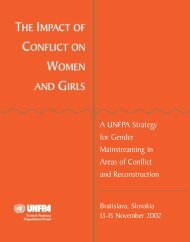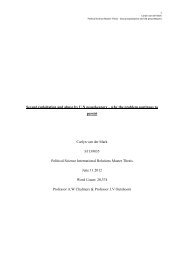Stop Sudah English-revised-March2012 - International Center for ...
Stop Sudah English-revised-March2012 - International Center for ...
Stop Sudah English-revised-March2012 - International Center for ...
You also want an ePaper? Increase the reach of your titles
YUMPU automatically turns print PDFs into web optimized ePapers that Google loves.
Until now, MamaYosepha Alomang still struggles to defend the human rights of the people although she<br />
has been repeatedly detained. In the 1990s, Mama Yosepha arrested <strong>for</strong> protesting the development of an<br />
airport, employee housing, and a Sheraton Hotel by P.T. Freeport that took people's land in the vicinity of<br />
Timika.<br />
Keerom District, 1995–96:<br />
Takeover of Communal Land <strong>for</strong> Oil Palm Plantations<br />
Tanjung Morawa II Limited Liability Archipelago Plantation Company (PTPN) used the People’s Core<br />
Plantation (PIR) system to manage the first oil palm plantations in Arso, Keerom District in 1982–83. 37 At<br />
the opening of the first plantation, the Governor of Papua promised the people they would get permanent<br />
housing, cars, and paved roads.<br />
The people were fooled by the promises, so that they gave 500 hectares of their customary land. But now, it's<br />
[become] 5000 hectares. The chief of the eight tribes was held at gunpoint to sign a letter handing over the Arso<br />
<strong>for</strong>est. While aiming a gun at him the soldier said: “You have to sign <strong>for</strong> the palm oil . . . tomorrow you will be rich,<br />
not poor anymore.” 38<br />
Since the arrival of the plantation company, local women most felt the impact on traditional sources of<br />
food, especially because of the conversion of their sago palm land to oil palm plantations, as seen in a<br />
woman’s following narrative:<br />
Be<strong>for</strong>e the plantations entered, we had vegetables; the dogs caught mice <strong>for</strong> us to eat. We also looked <strong>for</strong> fish in Tami<br />
Stream. There were lots of sago palms on the land that is now planted with oil palms. When they worked on the<br />
plantations, the women usually cleared the locations that were to be planted with the oil palms . . . while working,<br />
their hearts were sad because they saw that the sago trees had been felled. I felt sad . . .I cried . . . 39<br />
Another woman added:<br />
. . . we also lost our staple foods, like sago that was already difficult to get . . . Now, if you want to go to the <strong>for</strong>est<br />
[to search <strong>for</strong> sago] you must walk by foot a long way [kilometers] into the <strong>for</strong>est . . . now the <strong>for</strong>est is ruined. 40<br />
The lack of adequate in<strong>for</strong>mation regarding management of oil palms coupled with increasingly deplenished<br />
production, caused many people to realize the difficulty of managing oil palm plantations, and so they<br />
began to lease their land to transmigrants using a harvest-sharing system. The process of impoverishment in<br />
the community was visible. And in the midst of hardship in the family economy, women often experienced<br />
violence from their husbands, as told by a woman resident of Keerom:<br />
The people never got any knowledge about how to manage the oil palms. So, they sought help from newcomers<br />
[transmigrants] to harvest and sell it. So they divided the harvest . . . Beginning in 2007, the plantations were no<br />
longer producing . . . revenues declined . . . sago palms tree planted by tribes disappeared . . . there were no longer<br />
sources of food, while income from the oil palms was insufficient . . . Since then, my husband likes to get violence with<br />
37 ,The PIR system used advanced technology and often employed transmigrants to develop large plantations. According to a<br />
presidential decree, this system was intended as a “core” (inti) to help assist and support crop farmers in the surrounding region<br />
in an integrated and mutually beneficial system. Plantation crops covered by the scheme included oil palm, rubber, sugar cane,<br />
and other crops as determined by the Minister of Agriculture. See Presidential Instruction 1, 1986,<br />
http://naker.tarakankota.go.id/produkhukum/inpres01-1986.<br />
38 KER02 narrative.<br />
39 KER01 narrative.<br />
40 KER03 narrative.<br />
ENOUGH IS ENOUGH! 24




![IANSA [PDF, 2MB] - PeaceWomen](https://img.yumpu.com/25206379/1/190x123/iansa-pdf-2mb-peacewomen.jpg?quality=85)
![Commitments Sample [PDF, 93KB] - PeaceWomen](https://img.yumpu.com/25206331/1/190x245/commitments-sample-pdf-93kb-peacewomen.jpg?quality=85)










![A Toolkit for Advocacy and Action [PDF, 260KB] - Peace Women](https://img.yumpu.com/25205989/1/190x245/a-toolkit-for-advocacy-and-action-pdf-260kb-peace-women.jpg?quality=85)